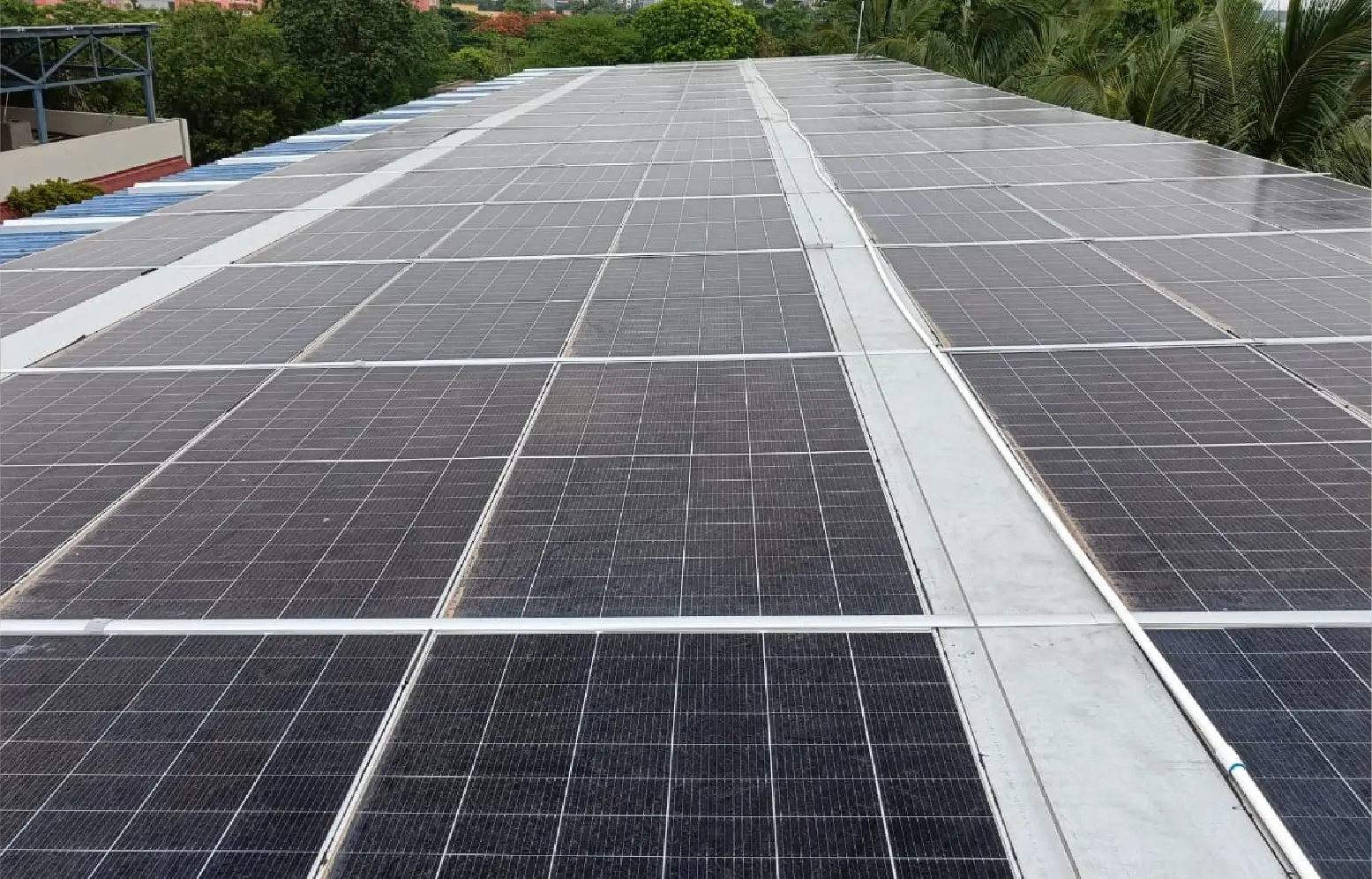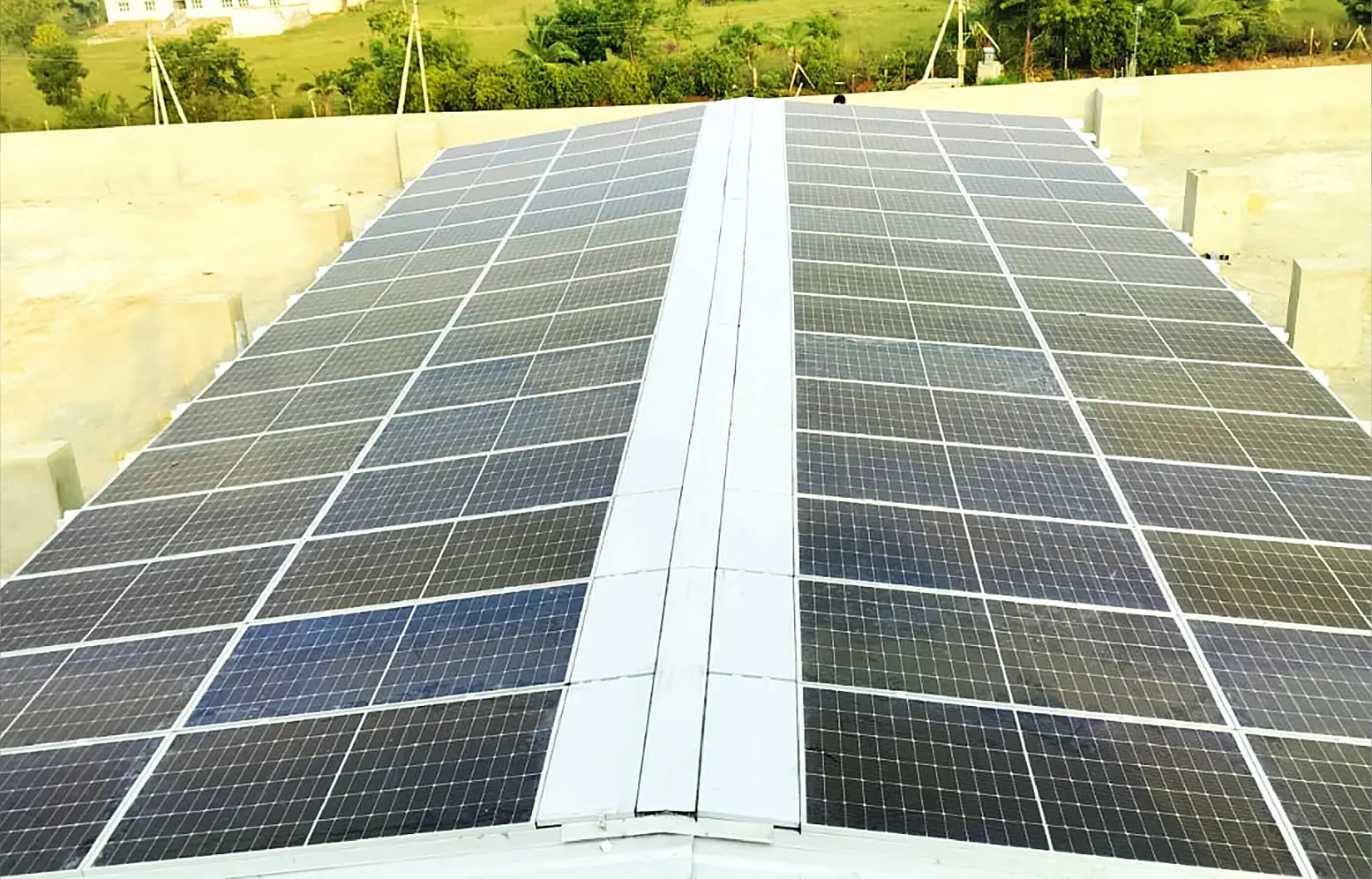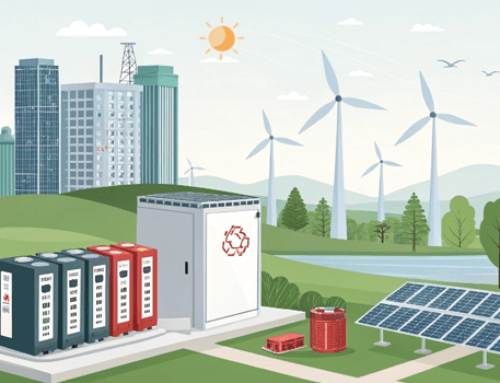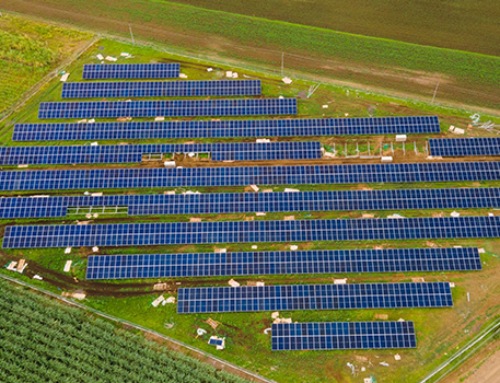

In November of 2022, one of the biggest cancer care providers in India, Healthcare Global commissioned a 2.25MW solar plant in Karnataka. The system would supply clean energy to two flagship cancer centres of HCG and help save approximately ₹4.2 crores every year.
HCG is not the only healthcare organization that has taken the solar route. In recent years, many hospitals have installed solar panels to cut down on their electricity bills.
In rural regions, solar is supplying critical power to children’s hospitals and maternity wards. Moreover, the Bihar government recently announced plans to solarize hospitals in the state on a priority basis.
One Indian state is breaking all records when it comes to solarizing healthcare centres. Since 2009, Chhattisgarh has been encouraging hospitals to switch to solar. The state government has already installed panels over 1432 government health centres which generate over 66, 72,200 kWh of electricity per year.
But why should the healthcare industry make a switch to solar energy?
Why Should Hospitals Go Solar?
Healthcare is an energy-intensive industry. Clinics, laboratories, medical wards, etc. require electricity for lighting, operating medical devices, refrigerating medicines, and other critical functions. This high energy demand has three primary effects:
1. Enormous electricity bills
2. High greenhouse gas emissions
3. Absolute dependency on unreliable resources
Switching to solar energy can help hospitals mitigate all three of these effects. Producing their own energy and selling the surplus to the grid would help healthcare organizations save big on monthly energy bills. Moreover, solar power is a clean energy resource that does not contribute to greenhouse gas emissions.
Lastly, hospitals can use this energy resource in addition to grid-based energy. Storing solar energy through battery-based systems would allow consumers to power their buildings even during load-shedding and grid failures.
Why Hospitals Need Energy Storage
While solar reduces daytime electricity expenses, hospitals operate round the clock. Critical departments such as ICUs, operation theatres, emergency wards, blood banks, and diagnostic labs cannot afford even a few seconds of disruption.
This is where BESS for hospitals infrastructure becomes essential.
By combining solar with energy storage for hospitals, excess solar energy generated during the day can be stored and used during nighttime, peak demand hours, or unexpected grid outages. This not only ensures uninterrupted patient care but also reduces reliance on diesel generators.
A well-designed Battery Energy Storage System in india helps hospitals:
- Maintain continuous power supply for life-saving equipment
• Reduce peak demand charges
• Increase solar self-consumption
• Minimize fuel costs from diesel backup
• Improve overall energy efficiency
Solar plus storage creates a resilient and intelligent energy ecosystem rather than just a power generation setup.
Benefits of Solar Energy for Hospitals
1. Cost Savings: The energy bills of hospitals are massive. By generating solar energy, organizations can significantly reduce their energy costs. According to a UNDP report, a healthcare facility can save up to 40% of its bills through this resource.
2. Reliability: Solar energy systems are more reliable than grid-based electricity, which is subject to power failures and load shedding. In such situations, hospitals can substitute the grid power through solar energy.
3. Low Maintenance: solar powered systems hardly require any maintenance apart from basic cleaning once every 2 weeks.
4. Durable: The average lifespan of a solar plant is 25 years. For this entire period, the system will act as a buffer against tariff hikes.
5. Reduces Carbon Footprint: The healthcare industry releases a massive amount of greenhouse gases into the atmosphere. By switching to a clean energy resource, organizations can cut down on these emissions.
How Can Hospitals Go Solar?
There are three types of installations hospitals can choose from while switching to solar energy:
1. Rooftop Solar– In this type of system, hospitals and clinics can install solar panels over their roofs. The only requirement is a shadow-free roof area with the space to hold the modules. Many hospitals across the globe have already installed rooftop solar systems.
2. Ground-mounted Solar– If an organization has access to a large shadow-free land area, it can use the space to set up a solar power system. HCG established a ground-based system across a 7.2-acre tract of land to provide energy for their hospitals.
3. Integrated solar roof solution– Solar solutions have advanced in recent years. Now, consumers have the option of installing an integrated solar roof where solar panels themselves act as the roofing agent.
With an innovative solar roof like Ornate InRoof, hospitals can turn their underutilized spaces such as carports, corridors, waiting for areas, etc. into mini-powerhouses and eliminate the need for sheet-roofing.
The L.V. Prasad Eye Institute (LVPEI), dedicated to eliminating preventable blindness through high-quality eye care, education, and research, has chosen Ornate InRoof technology to meet its energy needs sustainably.
Ornate Solar installed a 172 kW system across 11,794 sq. ft. at the Bhubaneswar center in Odisha and a 45 kW system over 2,818 sq. ft. at the Kadapa center in Andhra Pradesh, supporting LVPEI’s commitment to clean, renewable energy in healthcare.


Apart from these installations, the healthcare industry can also go the open access way, and source their solar energy from existing solar farms set up by the state at a price lower than thermal-based energy.
Integrating Energy Storage: UnityESS – Advanced BESS for Hospitals
As hospitals move toward sustainable energy solutions, integrating a reliable battery system becomes the next logical step.
Ornate Solar offers UnityESS – Energy Storage Solution, an advanced battery system that stores excess solar energy for later use, ensuring a continuous and reliable power supply even after sunset.
With over a decade of experience in renewable energy, Ornate Solar has developed a DC-coupled Battery Energy Storage System proudly designed and manufactured in India.
Backed by strong in-house R&D, UnityESS offers scalable capacity, intelligent monitoring, and long-term reliability — making it a dependable energy storage solution for hospital infrastructure that demands uninterrupted power.
Recent Solar Installations at Hospitals
| Hospital Name | Location | Size |
|---|---|---|
| Lotus Hospital | Karur, Tamil Nadu | 2.5 MW |
| Prachi Hospital Pvt. Ltd | Prayagraj, Uttar Pradesh | 108 kW |
| Pluse Hospital | Amritsar, Punjab | 101 kW |
| BL Aggarwal Healthcare Pvt Ltd | Sri Ganganagar, Rajasthan | 94 kW |
| Shripal Hospital Bhigwan Road | Pune, Maharashtra | 85 kW |
| Nirmal Dham Hospital | Karnal, Haryana | 47 kW |
| Sanjivani Hospital | Churu, Rajasthan | 21 kW |
About Ornate Solar
Ornate Solar is a leading solar company with 10 years of experience in the industry and the mission to reimagine the way solar is installed worldwide.
By not only partnering with the best-in-class solar brands but also developing our high-quality solutions, (panels, solar inverter, accessories, InRoof), we develop and deliver solutions that are modern, reliable, and effective.
Ornate Solar is also a trusted BESS manufacturer in India. We have developed UnityESS, an advanced energy storage solution to provide reliable power and energy independence.
If you are looking for high-quality solar solutions, reach out to us at 1800 2026 252 to discuss your options.















Hospitals embracing solar energy is a smart and sustainable choice. Kudos to those leading the way!
Great article on how hospitals can benefit from solar energy! It’s inspiring to see hospitals taking a proactive approach to reducing their carbon footprint and investing in renewable energy. Solar energy not only helps hospitals save money on their electricity bills, but it also supports their commitment to providing high-quality patient care.
One of the benefits of solar energy highlighted in this article is its reliability. In times of emergency, such as natural disasters or power outages, hospitals can continue to operate critical equipment and provide care thanks to the power generated by their solar panels. This is a great example of how solar energy can improve the resiliency of our healthcare system.
It’s also interesting to note that many hospitals are able to finance their solar projects through Power Purchase Agreements (PPAs), which can make the investment more affordable and manageable. This is an important consideration for hospitals, which often have limited budgets and resources.
Overall, I appreciate this informative article on the benefits of solar energy for hospitals. It’s encouraging to see hospitals embracing renewable energy and taking steps to create a more sustainable future.
Its good that hospitals are going with solar energy now. Beside hospital many other sectors should also move to solar energy. Nice article!
Solar energy can offer a number of advantages to a hospital, as outlined in this blog post! Thank you for sharing